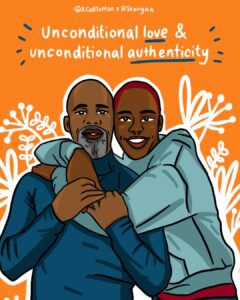Author: Morganne Kay

In today’s more gender-diverse and inclusive society, we often see folks in the LGBQ, transgender, and non-binary communities at the forefront of an evolution of language. I have viewed this evolution up close since our youngest child, Jalen, came out as gay at 15. From the time of Jalen’s birth until recently, Jalen’s pronouns were he/him/his. Jalen is a junior in college, and Jalen’s pronouns are now they/them/theirs.
A recent study showed that in transgender youth, using correct pronouns reduces depression and suicide risks. The acknowledgment of how someone identifies (in any capacity) demonstrates respect for that person. I understood the importance of respecting pronouns before Jalen shared that their pronouns had changed. For several years, our organization, A Call to Men, has incorporated pronouns as part of our core values supporting LGBQ, trans and gender-non-conforming folks. I have my pronouns in my email signature, Zoom, and Microsoft Teams identification, as well as social media profiles. Even with this basis for understanding, I am still on a journey in my aspiring allyship. I always will be.
Jalen and I were recently invited to share our perspectives on the groundbreaking Man Enough Podcast with co-hosts Liz Plank, Jamey Heath, and Justin Baldoni. During our interview, I kept tripping over Jalen’s pronouns. I would mistakenly refer to Jalen as “he” and “his” instead of “they” and “theirs.” I became very frustrated with my “mis-pronouning” — and therefore mis-gendering — my own child. My incorrect use of their pronouns was not intentional but rather born from a lifelong habit. While Jalen and the co-hosts showed great support and compassion for my struggle, the challenge was mine and mine alone. I write this realizing that other parents may also have difficulty breaking this habit, no matter how much they love, respect, or support their child. I write this to say that we are in this together — that I, too, am committed to lifelong learning (including inevitable mistakes along the way) in pursuit of a safer, more compassionate world for my children.
In a previous blog, I shared my fears for Jalen’s safety as a gay, Black male. I would be lying if I said I didn’t continue to have those fears in this new chapter of Jalen’s life — especially as they explore their gender expression and break out of the confines of the Man Box. When Jalen and I are together in public, and they’re rocking heeled boots and a skirt, I’m fearless. In fact, sometimes, I almost want onlookers to say something negative so I can challenge their ignorance and protect my child. Reactions run the gamut — lots of people look with fascination, a few with disdain, and everything in between. It’s the times when I can’t be there alongside Jalen when they lean into a look that expresses what Jalen calls their “femme side” that the fear hits me. I am constantly worried that someone will bully, physically or sexually assault them, or put them in harm’s way.
Jalen inspires me every day, and I look forward to a lifetime of learning from their example of embracing their whole self. At the same time, I’m afraid the world won’t see the same courage and humanity in Jalen that I do. I’m terrified that Jalen, like so many folx at the margins of the margins, will be met with violence and fear instead of the unconditional acceptance they deserve. As a father, I have been most proud of Jalen’s courage, strength, and love for self—as well as their positive self-esteem in the face of bias, discrimination, ignorance, heterosexism, and homophobia.
LGBTQI+ and gender non-conforming people have always been a vital and significant part of our families, communities, and societies. Patriarchy, the Man Box, and heterosexism dictate that if you do not identify as cis-gendered and heterosexual, you are different and not “normal.” But Jalen and the tens of millions of others living their most authentic lives across the country are a testament to the beauty and power of forging our own path.
Definitions:
Nonbinary and/or gender-nonconforming — when your gender expression (behavior, appearance, mannerisms, interests) differs from “typical” expressions of masculinity or femininity. Nonbinary people sometimes use pronouns such as they, them, and theirs.
Cisgender — when your gender identity (how you feel) matches the sex you were assigned at birth. For example, someone who identifies as a man and was born male.